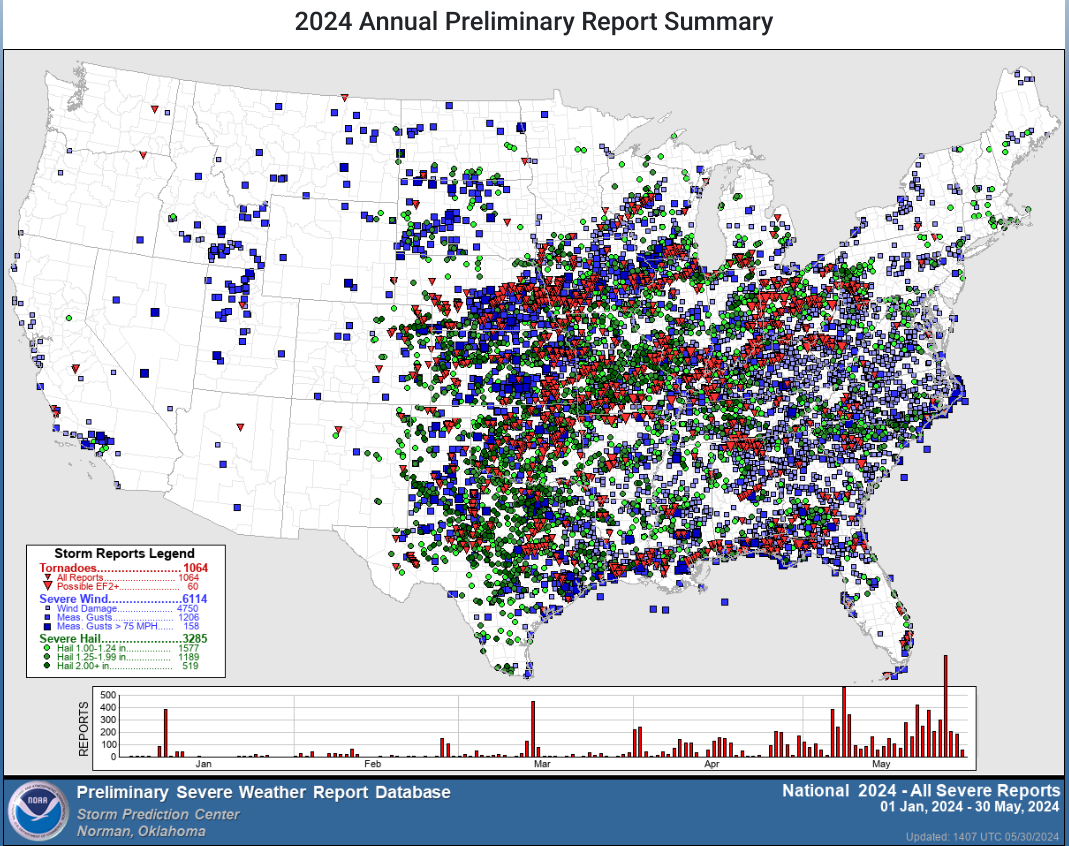Reuters' Andre Romani and Leticia Fucuchima reported Tuesday that "soybean losses related to recent floods in Brazil's southernmost state of Rio Grande do Sul were estimated at 2.71 million metric…
Active Severe Weather Spring Causes Planting Season Challenges
Fox Weather’s Andrew Wulfeck reported Thursday that “a spring severe weather season under a diminishing El Niño helped propel the fifth month of the year to become the second-most-active May for tornadoes, hail and damaging winds, only to be outdone by 2011.”
“Through the first 28 days of May, the National Weather Service’s Storm Prediction Center received nearly 5,700 reports of severe weather, including 475 tornadoes,” Wulfeck reported. “An average May only produces somewhere in the neighborhood of 275-300 tornadoes, meaning tornadic activity was some 70% above average. Most of the tornadoes occurred during outbreaks from May 6-10, May 19-24 and May 25-27, which accounted for at least 300 of the initial reports.”

In addition to the active May, USA Today’s Elizabeth Weise, Dinah Voyles Pulver and Doyle Rice reported Wednesday that, since the beginning of 2024, there have been “at least 850 confirmed tornadoes so far and several major tornado outbreaks,” making it “at least the sixth-busiest in the past 30 years, based on preliminary information from the Storm Prediction Center.”
“Preliminarily, the U.S. has seen four days with at least 30 tornadoes rated EF1 or stronger, said (Harold Brooks, a senior scientist at the National Severe Storms Laboratory in Norman, Oklahoma),” according to the reporting from Weise, Pulver and Rice. “The average is two a year. That likely puts 2024 in the top 10% of years.”
Severe Weather Causing Planting Delays
Iowa Capital Dispatch’s Jared Strong reported earlier this week that “Iowa farmers had an average of about two days available for field work last week due to severe weather that spawned damaging winds, nearly 30 tornadoes and triple the typical precipitation, according to the U.S. Department of Agriculture.”
“‘Our hearts go out to all the Iowans and communities who have been affected by the recent rounds of devastating severe weather,’ said Mike Naig, the state’s agriculture secretary,” Strong reported. “He added: ‘Planting progresses as conditions allow, but many farmers continue to face delays.'”
Weather Damaging Crops, Too
While severe weather is causing planting delays in some Midwestern states, farmers across the southern Plains are dealing with crop damage after severe weather rolled through their region earlier this week. For example, KCBD 11’s Parker Shofner reported Wednesday that “farmers (around Lubbock, Texas) are assessing the damage after severe weather plowed through the South Plains Tuesday night.”
Keith Layton, a cotton, corn, and wheat farmer in Lamb County, Texas, told “KCBD that at least eight of his crop circles have been hailed out, but it’s not just his fields that suffered damage.”
“‘Lots of my neighbors, especially in the Bula area here, it’s really bad,’ Layton said,” according to Shofner’s reporting. “…’The wheat is probably going to have to have an insurance adjuster to that, because of the loss there,’ Layton said.”
In Jonesboro, Arkansas, K8 News’ Ryan Vaughan reported on May 23 that “the storms started plowing through the more rural parts of Region 8, hitting farmlands hard. The busted windows, dented cars, and wind-torn city buildings were easy to spot, but when you get out of the city limits and into the fields, the scars of Wednesday’s storms look a little different but just as costly.”
“‘If the guy doesn’t have any hail insurance or greensnap insurance, it’s a huge expense as far as corn goes. We’ve lost some cotton stands too. We’ve had some beans hurt pretty severely,’ said crop consultant David Hydrick,” according to Vaughan’s reporting. “’At least the beans will come back. The cotton will have to be replanted or planted to beans. Some of it will be farmed as is, but if you don’t have hail insurance, it’s going to hurt bad.'”







